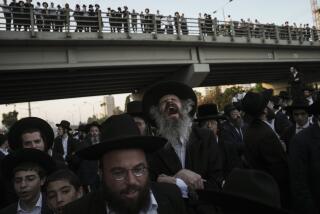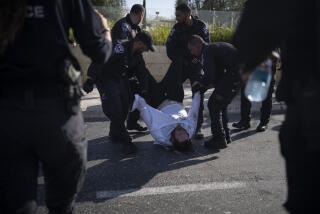Israel Outlaws 2 Extremist Groups : Mideast: The government labels Kach and Kahane Chai terrorist organizations. The decision seems a key step in meeting Palestinian demands for protection.
JERUSALEM — The Israeli government, reacting to the massacre two weeks ago of about 30 Palestinians in the West Bank city of Hebron, on Sunday outlawed two extremist Jewish groups as “terrorist organizations” because of their repeated violence against Arabs.
In banning Kach and Kahane Chai, both inspired by the ultranationalist, anti-Arab ideology of the late Rabbi Meir Kahane, the Cabinet made their leaders subject to 20 years in prison, and rank-and-file members, estimated to number about 400, liable to five years in jail if they continue their activities.
Kach, saying it will challenge the government order in court, responded in a statement: “We express our disgust at the fascist decision of the government. It is a surrender to PLO demands.”
The decision did appear to be an important step toward meeting demands of the Palestine Liberation Organization that Palestinians in the West Bank and Gaza Strip be protected from Israeli settlers, operating as vigilantes, before talks resume on implementing an accord on Palestinian self-government.
The PLO is pressing the government of Prime Minister Yitzhak Rabin for firmer action in curtailing attacks by Israeli settlers and strengthening day-to-day security for Palestinians before it resumes the negotiations.
“The government of Israel intends to continue all measures necessary to ensure security within the boundaries of law,” the Cabinet said in a special communique, seeking to assure the Palestinians of greater protection.
“It reaffirms its commitment to promote maximum security to all residents and to act with its full authority to prevent a repetition of any acts of murder.”
Palestinians welcomed the Israeli move but said more was needed to revive the peace talks.
“This is a positive development toward redressing a basic injustice in the Israeli judicial system,” said Hanan Ashrawi, former spokeswoman for the Palestinian delegation to the Middle East peace talks, adding that the Israeli government must go further to disarm all Israeli settlers and remove them from Palestinian cities and towns.
“These extremists are still walking freely in the streets, near our towns and villages,” Adnan Dameir, a PLO leader in the West Bank, commented. “It is not enough to declare these organizations illegal, but allow its members to remain on our streets.”
Atty. Gen. Michael Ben-Yair said in announcing the Cabinet’s decision that the continuing violence against Palestinians by members of Kach and Kahane Chai has created an extremely dangerous situation in the occupied territories. There was “no way to avoid infringing on the basic rights of people in these organizations,” Ben-Yair said.
Dr. Baruch Goldstein, who gunned down about 30 Palestinians on Feb. 25 while they prayed at the Cave of the Patriarchs, was a longtime member of Kach, as are other settlers in Hebron and nearby Kiryat Arba.
Leaders of Kach and Kahane Chai have praised as a holy martyr the Brooklyn-born Goldstein, who was beaten to death by survivors of the massacre.
Ben-Yair said the new ban will also apply to any organizations with the same goals, which include “establishment of a theocracy through all the biblical Land of Israel and the violent expulsion of Arabs from that land.”
The decision won immediate support from former Prime Minister Yitzhak Shamir. The hard-line rightist had fostered the settlement movement in the West Bank, but he nonetheless said: “Our country has no need for such organizations. No good can come from them.”
The ban also makes supporting the groups or raising money for them punishable by three years in prison. Israeli officials said supporters from the United States could be barred from visiting Israel. Both groups raise funds extensively among American Jews.
But some observers warned that banning Kach and Kahane Chai will only work if the decision is followed up with tough police action to ensure their members do not regroup underground.
“In addition to outlawing the organizations, their leaders and members must be personally chased,” Ehud Sprinzak, a political scientist at Hebrew University, said. “They already believe the government of Israel is totally illegitimate and must be opposed by any and all means, including arms. You don’t get more radical or dangerous than that.”
Kach leader Baruch Marzel, who has been in hiding for the last two weeks, immediately telephoned Israel Army Radio to denounce the decision, and he warned that the government might do “even worse things” as it hunted Kach members down.
Marzel nonetheless said Kach will suspend its activities pending a court ruling on the decision. The Boston-born Marzel, who lives in Hebron, took over Kach’s leadership after Meir Kahane was murdered in New York City in November, 1990, and the movement splintered into several feuding factions, including Kach, Kahane Chai, Yeshiva of the Jewish Idea and Yeshiva of the Temple Mount.
But David Axelrod, spokesman for Kahane Chai, said his group was already operating secretly.
“Not just underground, but we will operate from jails,” he boasted in a telephone interview with state-run Israel Radio.
Two weeks ago, the Cabinet authorized the detention without trial of five leaders from Kach and Kahane Chai, including Marzel, restrictions on the movements and activities of 18 more members and the disarming of some settlers.
The Cabinet acted under a 1948 law originally drafted by the British for use against underground Jewish forces fighting for Israeli independence. The law was later employed against extremist Jewish groups, then against the PLO and other Palestinian groups.
According to Israeli sources, Rabin wanted the ban before leaving today for Washington, where his talks with President Clinton will focus on reviving negotiations the PLO on Palestinian autonomy.
More to Read
Sign up for Essential California
The most important California stories and recommendations in your inbox every morning.
You may occasionally receive promotional content from the Los Angeles Times.










